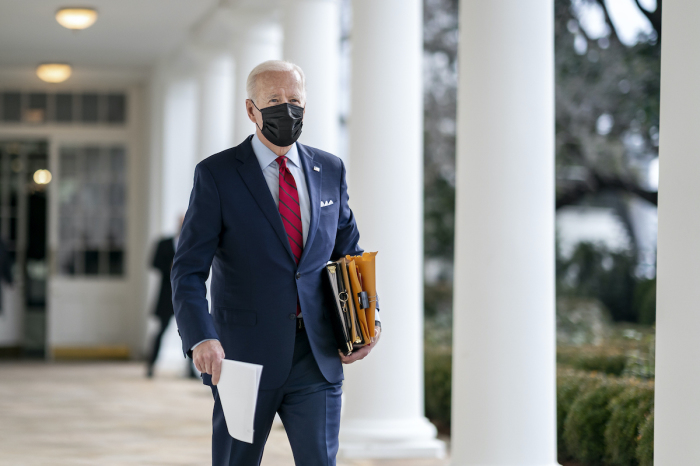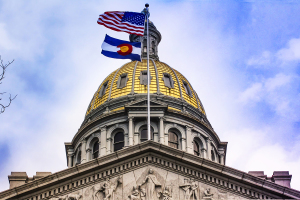Biden spending binge, unjust measures and robbing the poor

President Biden pointed to the federal government’s promotion of railroads in the 19th century to show that Americans have always supported state-built infrastructure. He said, "Two hundred years ago, trains weren't traditional infrastructure either until America made a choice to lay down tracks across the country."
Of course, he is right. Most Americans have always wanted the state to spend more on a long list of things. But the railroads offer a terrible example. Read Dr. Thomas DiLorenzo’s How Capitalism Saved America. Because Congress funded the expansion of railroads, politicians dictated where the rails would go, which meant the iron traveled to towns in their districts where they needed to pay back large campaign contributors. Rails going through a town increased the value of real estate near them by a large amount and made those campaign contributors richer.
Because politicians and not business people determined where to lay the rails, all but one railroad went bankrupt, the Great Northern Railroad. People who bought railroad bonds to pay for their retirement lost their nest eggs. The government’s record of creating fraud, waste and abuse through infrastructure spending is well documented for anyone who wants to know. The mainstream media does a decent job of reporting it. People just don’t care. It’s not their money, they think.
Americans become alarmed if they think something is immoral or an injustice has been committed so I want to focus on that. In the last article I examined the morality of leaving our grandchildren with a crushing burden in the national debt. How the government finances Biden’s binge is a moral issue as well because the money to pay for it will come from stealing from the poor. Here’s how:
Since the World War II era, governments have preferred to borrow money to pay for spending above tax revenues. Lately, the deficit has been running around $1 trillion per year. Americans don’t save enough to finance such a massive amount of borrowing, so we borrow from China and other countries and thereby increase our trade deficit with those countries. But that’s still not enough so the Federal Reserve buys the rest of the debt.
The Fed owns about $10.81 trillion of federal debt. The amount of debt it buys depends on changing policy goals. On March 15, 2020, the central bank announced that it would purchase at least $500 billion of Treasuries a month because of the COVID recession.
How does the Fed pay for federal debt? Commonly, people say the Fed “prints” the money, as if the Fed were a counterfeiter. Actually, it credits the accounts of banks that are part of its system. The process would be similar to your bank crediting your account with a deposit even though you hadn’t sent it a check. So where does the Fed get the money to buy the treasuries? It creates it out of thin air. The Fed has a monopoly on counterfeiting credit money. That’s why the phrase “printing” money to describe the process is appropriate.
Because the bank whose account the Fed credits has more cash reserves from the sale of government debt, it can loan those reserves to others and increase the supply of money. Every dollar of bank reserves the Fed creates out of thin air spawns roughly ten additional dollars as borrowers deposit their cash in other banks and those banks relend the money.
What does that have to do with theft from the poor? The answer is that increasing the money supply causes prices to rise or stay the same when they should have fallen. The people who get the new money first benefit because they can buy assets, such as houses, before prices rise. Then rising prices increase their wealth. Housing prices are up 15% in the past year, making affordable homes hard to find.
Workers in the financial industry and government usually get the money first while the working poor get it last, after prices have risen, and that makes them poorer. The Fed’s monetary policy is a tax on the poor for the benefit of the wealthy and one of the major contributors to rising inequality.
The Fed’s technique is more sophisticated but no different in its effect from the times in the past when monarchs used to melt down gold coins, add copper then stamp them with the claim that they had the same gold content as before. The monarch would pay his debts with the debased coins, but that increased the supply of money and caused prices to rise, which impoverished the people.
Money acts as a reference point that allows us to compare the values of different things from donkeys to donuts. It is like measures of length or weight. When the Fed creates new money out of thin air, it changes the value of money because a dollar buys less in the market. That’s one definition of inflation. The Bible warns about using such false measures: “You shall do no wrong in judgment, in measures of length or weight or quantity” (Leviticus 19:35). “A false balance is an abomination to the Lord, but a just weight is his delight” (Proverbs 11:1). “You shall not have in your bag two kinds of weights, a large and a small. You shall not have in your house two kinds of measures, a large and a small” (Deuteronomy 25:13-16). The Fed commits the evil of unjust measures when it debases our money.
Isaiah condemned the debasing of money in 1:22: “Your silver has become dross, your wine mixed with water.” In the same way that merchants added water to the wine and sold it as pure wine, they added so much base metal to silver coins that they became worthless as dross, the scum on the surface of molten metal.
Amos joined Isaiah with the same indictment: “Hear this, you who swallow up the needy, and make the poor of the land fail, [ ...] Making the ephah small and the shekel large, falsifying the balances by deceit, that we may buy the poor for silver, and the needy for a pair of sandals" (Amos 8:4-6). Making the ephah, the measure of grain, small, merchants defrauded the poor with false measures. By enlarging the shekel, they debased the money so more of it was needed to buy a given product which caused higher prices. The increased poverty made it easier to enslave the poor.
In addition, the Fed’s monetary policies cause the boom and bust business cycles in which the bust, or recessions, hit the working poor the hardest through higher unemployment. The wealthy, on the other hand, have many ways to protect their wealth from inflation and recessions.
The Fed enables Biden’s spending binge by purchasing much of the debt it creates. Without the Fed matching Biden’s binge with massive buying, interest rates would rise and make interest payments on the debt too large for the government to bear. Washington would be forced to cut spending. However, the cost of this pas de deux is increasing inequality and lower standards of living for the working poor.
Isaiah warned the government of Israel many times about robbing the poor. In 3:15 he wrote, “Why do you crush my people and grind the faces of the poor?" The princes of Israel, the state, bribed judges to render unjust verdicts against the poor to steal their property. The Fed commits a similar crime, but it’s more sophisticated and few people understand it.
Roger D. McKinney lives in Broken Arrow, OK with his wife, Jeanie. He has three children and six grandchildren. He earned an M.A. in economics from the University of Oklahoma and B.A.s from the University of Tulsa and Baptist Bible College. He has written two books, Financial Bull Riding and God is a Capitalist: Markets from Moses to Marx, and articles for the Affluent Christian Investor, the Foundation for Economic Education, The Mises Institute, the American Institute for Economic Research and Townhall Finance. Previous articles can be found at facebook.com/thechristiancapitalist. He is a conservative Baptist and promoter of the Austrian school of economics.





























